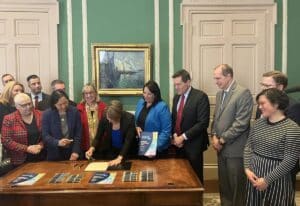
Gov. Maura Healey signs her administration's economic development plan, as her administration now looks to file an accompanying bill in the new year, on Tuesday, Dec. 12, 2023. Photo by Alison Kuznitz | State House News Service
The sweeping economic development plan that Gov. Maura Healey signed off on Tuesday calls for an ambitious slate of workforce development initiatives, plus investments in key sectors like the life sciences. But the governor declined to put a price tag on the package that will be put before lawmakers as an economic development bill in the new year.
The plan paints the administration’s picture of the future of the Massachusetts economy in broad strokes. The legislation that is to come will have to get more specific and detailed, something that House and Senate leaders said Tuesday the Legislature is looking forward to. Healey, asked whether she might file the legislation in January or February, told reporters inside her ceremonial office, “Well, we hope to be able to file as soon as possible.”
“Obviously, we’ve given a lot of thought and consideration to different parts we’d like to see included. And in terms of the revenue scenario right now, I mean anything we do we take account of the revenue scenario, but look, we’re about moving forward,” Healey said in response to a reporter’s question about recent trends, which have shown below-benchmark tax collections. “We’re about moving forward with energy, with intentionality and bringing home great results and opportunities for the state.”
Asked how much the bill and plan might cost, Healey said, “I’m not going to put a figure on that right now.”
New governors are required to produce a comprehensive economic development plan in the first year of their administration. The Healey administration’s plan, called “Team Massachusetts: Leading Future Generations,” looks at how the state can tackle long-standing problems, such as insufficient housing production and unreliable transportation networks, to support the state’s economic growth.
The strategy laid out in the plan calls for Massachusetts to work to maintain its lead in major sectors like life sciences and health care, advanced manufacturing and robotics, and artificial intelligence, while also establishing new dominance in climate technology and tourism.
To attract and retain talent, the plan calls for a statewide internship program that would come with a tax incentive for Massachusetts companies, as well as more workforce pipelines for international students. The commonwealth should also focus on workforce development and training efforts in industries including the life sciences, advanced manufacturing, health care and clean energy, while expanding career paths for trades like plumbers and electricians and simplifying the licensing process, according to the plan.
“This is not just a document that’s going to sit on a shelf – it’s really action-oriented,” Lt. Gov. Kim Driscoll said.
Senate President Karen Spilka, who helped craft a 2010 law containing the requirement for the economic development plan, praised administration officials for ensuring their plan reflects feedback from residents and businesses owners throughout the state. The Ashland Democrat said she was “very optimistic” about the economic development initiatives that the Legislature and administration could accomplish together.
“I’ve been in the Legislature long enough to appreciate that the secret to success lies in the details,” Spilka said. “So I think I can speak for all of my colleagues in the Senate when I say that we really look forward to digging into the details, working closely with the administration, finding the areas of common cause where we can collaborate. And I’m heartened by the fact that the Healey-Driscoll administration, they have been so enthusiastic partners in some of the most important policy wins that we have seen for the people of Massachusetts, including – and you all know these – free community college, tuition equity, universal free school meals, meaningful investments in early education and care, and progressive tax relief.”
Rep. Ann-Margaret Ferrante, who said she was speaking on behalf of House Speaker Ron Mariano, reflected on the post-pandemic economy and its “unprecedented” challenges, including stagnant inflation and unknown federal monetary policy. Ferrante, invoking her past experience working with Spilka on economic development issues, said she looked forward to cooperation among the two branches.
Addressing Economic Development Secretary Yvonne Hao, Ferrante said, “And certainly, secretary, with you and your crew, we are looking forward to the actual economic development bill that allows us to put pen to paper, dollars to programs, so that we do extend those leads and so that we bring forth to this commonwealth the greatest harvest that we have seen economically in the longest time.”
Hao likened the economic development plan to the administration’s North Star, providing a blueprint to ensure all residents and businesses have opportunities to succeed here.
“We’re going to lead by being two things at the same time: We’re going to be an awesome, strong, innovation-driven economy that is solving big important mission-driven problems,” Hao said, as she offered examples tied to climate change, medical research and AI. “And we’re going to do that in a way that is human and humane, where we celebrate fields where we let you love who you want to love, where we believe in science, we believe in safety. We’re going to be both of these things at the same time, and that is the vision for this plan.”




 |
| 

